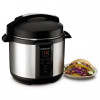Cuisinart CPC-400 User Manual - Page 8
Cleaning And, Maintenance
 |
View all Cuisinart CPC-400 manuals
Add to My Manuals
Save this manual to your list of manuals |
Page 8 highlights
CLEANING AND MAINTENANCE 1. Unplug the power cord before cleaning. 2. Clean the outer body with a soft cloth, such as a paper towel or microfiber cloth. Do not immerse the outer body in water or pour water into it. 3. Remove the sealing ring assembly (Part #4) from the inside of the lid by grasping the knob and pulling. Set aside. 4. Remove the pressure limit valve (Part #1) (see figure 9) from the lid by gripping and pulling firmly upward. Rinse with warm water, and dry. careful not to damage the inside coating. Never use harsh chemicals or scouring pads or metal utensils. NOTE: If scouring is necessary, use a nonabrasive cleaner or liquid detergent with a nylon pad or brush. 10. To clean the condensation collector, remove and clean it with warm, soapy water, then reinstall it (figure 11). 9. 5. Rinse the upper and underside of the lid (Part #13) with warm water, including the air escape on the underside and the red float valve (Part #2). Dry completely, and replace pressure limit valve (Part #1). 6. To clean sealing ring assembly, carefully remove sealing ring assembly (Part #4) and clean with a dampened cloth or microfiber cloth. Do not use chemical cleaners. Wash metal plate with warm, soapy water, dry thoroughly and replace sealing ring or place in the dishwasher. 7. To clean the rubber grommet in center of sealing ring assembly, carefully remove it, clean it, and replace it. 8. Replace sealing ring assembly in lid. BE SURE KNOB FACES OUT (figure 10) and "THIS SIDE OUT" is facing you. 11. NOTE: Condensation may collect on the bottom rim of the lid. Liquid will collect on the top of the base and drain into the condensation collector. 11. Any other servicing should be performed by an authorized service representative. 10. 9. Cooking pot is dishwasher safe. To hand-wash the pot, use warm, soapy water and wipe dry. Be 8















